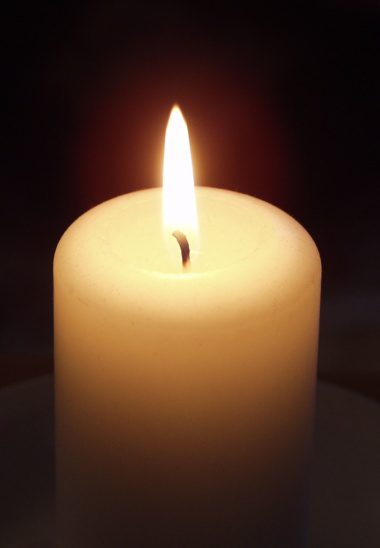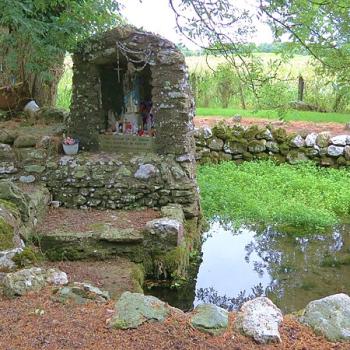I’d like to open this article with something of a disclaimer. I understand that this entry is very United States-centric. But the topic isn’t. I find it important to “write what you know” when discussing matters of the heart or mind, and as an Earth-Centered Pagan I know the geography, seasons, and culture of my home. I feel, however, that thankfulness is something all Unitarian Universalists and all Pagans can and should identify with, regardless of season or location, so I hope that this writing will be of interest to everyone who comes across it.
 This year I put off buying candy for Halloween trick-or-treaters until October 30th. I wasn’t surprised to find that the selection of treats in our local grocery store had been well picked over. I was, however, shocked that those that were left had been relocated and replaced by Christmas candy. “Whatever happened to Thanksgiving? Christmas isn’t supposed to start until after Thanksgiving!” I said to my family in frustration and disbelief. I had noticed over the years that the commercial seasons for Halloween and Christmas had been expanding, but it still seemed like a leap for the two to suddenly meet in the middle, displacing Thanksgiving. Since that trip to the market, I have noticed town centers putting out Christmas decorations, neighbors hanging Christmas wreaths and lights, and advertisements going up for Santa-themed events. My husband saw Christmas trees for sale on his drive home earlier this week.
This year I put off buying candy for Halloween trick-or-treaters until October 30th. I wasn’t surprised to find that the selection of treats in our local grocery store had been well picked over. I was, however, shocked that those that were left had been relocated and replaced by Christmas candy. “Whatever happened to Thanksgiving? Christmas isn’t supposed to start until after Thanksgiving!” I said to my family in frustration and disbelief. I had noticed over the years that the commercial seasons for Halloween and Christmas had been expanding, but it still seemed like a leap for the two to suddenly meet in the middle, displacing Thanksgiving. Since that trip to the market, I have noticed town centers putting out Christmas decorations, neighbors hanging Christmas wreaths and lights, and advertisements going up for Santa-themed events. My husband saw Christmas trees for sale on his drive home earlier this week.
I think the cause of the marketing shift is fairly clear. Bringing in more than $7 billion a year, Halloween is now the second most profitable holiday for retailers in the United States. And during the season of Christmas, Kwanza, and Hanukkah, people will spend more than $600 billion. Don’t get me wrong—I’m not Scrooge. I love this time of year and I spend money on Samhain and Yule. But without the candy and costumes, trees, wreaths, gifts, holiday mascots, and decorations, Thanksgiving is increasingly being squeezed out of the picture because a homemade meal and children’s school crafts don’t bring in nearly as much money.
And this shift goes much deeper than the commercial sales and external trappings of the holiday. It is my fear that the spirit and meaning of Thanksgiving is being lost in our culture as well.
At this point you may be thinking to yourself, “But Thanksgiving isn’t a Pagan holiday. It doesn’t even fall at the same time as a sabbat.” I argue that Paganism and Unitarian Universalism are both Thanksgiving-centered movements. We have cast off the mantles of judgement and guilt that characterize and motivate many other religions, and have instead chosen to celebrate life and the universe. This is the very essence of Thanksgiving. And I feel it is therefore our responsibility to actively work to protect and restore the times that our cultures have set aside for giving thanks.
The spirit of thankfulness forces us to pause and to stop taking our blessings for granted. This is essential for finding joy in life. After all, contentment is wanting what we already have. Thankfulness is also critical in our social justice work. If we don’t realize what we have and how lucky we are to have it, then we cannot sympathize or empathize with those who are in need. It is too easy in our culture to forget that many people don’t have access to the basic necessities that we overlook every day. When I stop to consider and give thanks for the roof over my head, the heat from my furnace, the food in my pantry, the security of my community, and the good health of my family, then I can better contemplate what it would be like to live without them. When I then consider all of the additional comforts I enjoy, then I feel compelled to share what I possess with others, including my time, energy, money, and belongings. Generosity and happiness are the glorious offspring of thankfulness.
As UU-Pagans we should weave thanksgiving into all of our activities. The irony is that this can be quite a challenge during the time of the year when the actual holiday of Thanksgiving falls in the United States. I’ve already mentioned the increasing frenzy of the Hanukkah, Kwanza, and Christmas season. Expanding the preparation for these holidays earlier into the year implies that our resulting celebrations should be bigger, fancier, and more ideal than ever. Couple this pressure with decreasing daylight and increasingly cold and inclement weather, and it can seem like November isn’t a good time to be thankful at all.
But we truly need to pause and give thanks in the dark. In order to give ourselves the space to do this, we will have to use our power as consumers to push back against the growing holiday insanity. This year multiple large companies have announced that they won’t be forcing their employees to work on Thanksgiving, proving that as customers we have a voice and they will listen. Let’s reclaim November and set it aside as a consecrated time for true thanksgiving, something our society desperately needs as a counterbalance against the material greed and environmental destruction caused by the consumption that has built up around this season.
When we give thanks in the dark, the light becomes more beautiful. When we are thankful during the night, it becomes easier to be thankful during the day. The dark is a wonderful place to stop, take a deep breath, and rest in the spirit of thanksgiving. Let us gather in an attitude of peaceful simplicity and sharing with our friends and family this season and show the world how to be thankful in the dark, because there is no better time to appreciate all that we have.

















